小王子英文
- 格式:pptx
- 大小:33.95 MB
- 文档页数:25
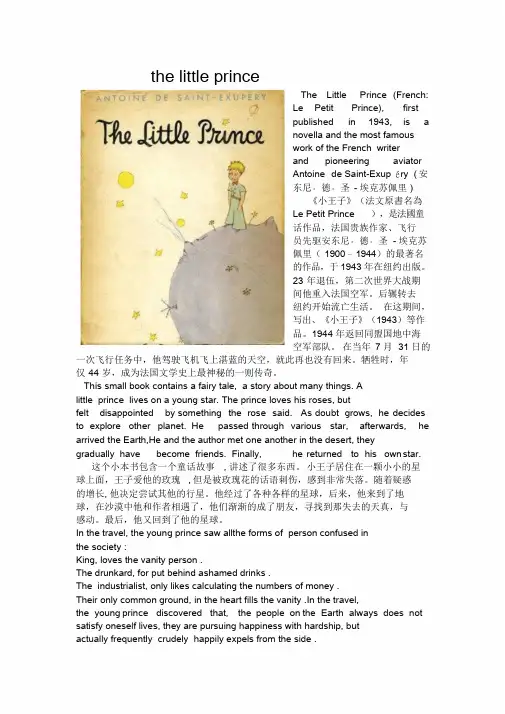
the little princeThe Little Prince (French:Le Petit Prince), firstpublished in 1943, is anovella and the most famouswork of the French writerand pioneering aviatorAntoine de Saint-Exup éry ( 安东尼·德·圣- 埃克苏佩里)《小王子》(法文原書名為Le Petit Prince ),是法國童话作品,法国贵族作家、飞行员先驱安东尼·德·圣- 埃克苏佩里(1900–1944)的最著名的作品,于1943年在纽约出版。
23 年退伍,第二次世界大战期间他重入法国空军。
后辗转去纽约开始流亡生活。
在这期间,写出、《小王子》(1943)等作品。
1944 年返回同盟国地中海空军部队。
在当年7 月31 日的一次飞行任务中,他驾驶飞机飞上湛蓝的天空,就此再也没有回来。
牺牲时,年仅44 岁,成为法国文学史上最神秘的一则传奇。
This small book contains a fairy tale, a story about many things. Alittle prince lives on a young star. The prince loves his roses, butfelt disappointed by something the rose said. As doubt grows, he decides to explore other planet. He passed through various star, afterwards, he arrived the Earth,He and the author met one another in the desert, theygradually have become friends. Finally, he returned to his own star.这个小本书包含一个童话故事, 讲述了很多东西。
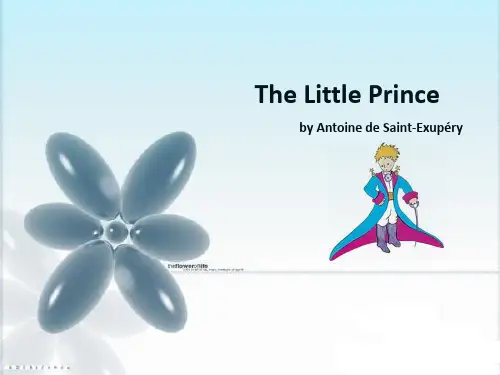
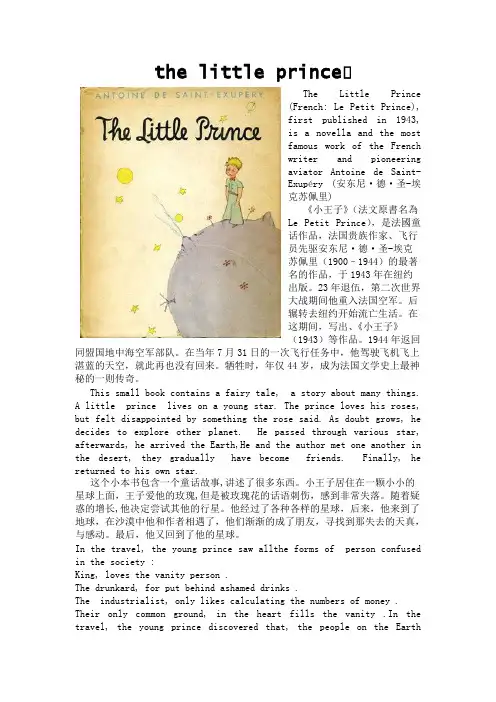
e an dAl l t h i ng si nt he i rb ei n ga re go od fo rs the little prince The Little Prince (French: Le Petit Prince), first published in 1943, is a novella and the most famous work of the French writer and pioneering aviator Antoine de Saint-Exupéry (安东尼·德·圣-埃克苏佩里) 《小王子》(法文原書名為Le Petit Prince ),是法國童话作品,法国贵族作家、飞行员先驱安东尼·德·圣-埃克苏佩里(1900–1944)的最著名的作品,于1943年在纽约出版。
23年退伍,第二次世界大战期间他重入法国空军。
后辗转去纽约开始流亡生活。
在这期间,写出、《小王子》(1943)等作品。
1944年返回同盟国地中海空军部队。
在当年7月31日的一次飞行任务中,他驾驶飞机飞上湛蓝的天空,就此再也没有回来。
牺牲时,年仅44岁,成为法国文学史上最神秘的一则传奇。
This small book contains a fairy tale, a story about many things. A little prince lives on a young star. The prince loves his roses, but felt disappointed by something the rose said. As doubt grows, he decides to explore other planet. He passed through various star, afterwards, he arrived the Earth,He and the author met one another in the desert, they gradually have become friends. Finally, he returned to his own star.这个小本书包含一个童话故事,讲述了很多东西。
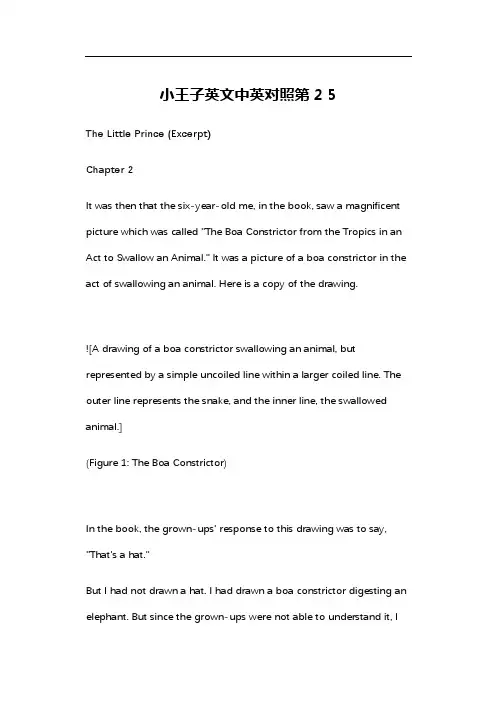
小王子英文中英对照第2 5The Little Prince (Excerpt)Chapter 2It was then that the six-year-old me, in the book, saw a magnificent picture which was called "The Boa Constrictor from the Tropics in an Act to Swallow an Animal." It was a picture of a boa constrictor in the act of swallowing an animal. Here is a copy of the drawing.In the book, the grown-ups' response to this drawing was to say, "That's a hat."But I had not drawn a hat. I had drawn a boa constrictor digesting an elephant. But since the grown-ups were not able to understand it, Imade another drawing: I drew the inside of the boa constrictor, so that the grown-ups could see it clearly. They always need to have things explained. My Second Drawing looked like this:The grown-ups advised me to put aside my drawings of boa constrictors, whether from the inside or the outside, and devote myself instead to geography, history, arithmetic, and grammar. That is why, at the age of six, I gave up what might have been a magnificent career as a painter. I had been disheartened by the failure of my Drawing Number One and my Drawing Number Two. Grown-ups never understand anything by themselves, and it is tiresome for children to be always and forever explaining things to them.Chapter 5As each day passed, I would learn, in the morning, from the flowers,and at night, from the stars. I would already have loved to take my sheep and go off somewhere else. But the recollection of the flower that I had left behind atone for my ingratitude. All the stars are good, he used to say, and he made lovely tricks with them. But he never could do anything really important. My flower is ephemeral, and she has only four thorns to defend herself against the world. And I have left her on my planet, all alone!That is why it is of the greatest importance to me, and also, I believe, to the little prince, that the sheep should eat his flowers with the utmost care.He assured me that it would be so: "It is true that they do not eat bushes or flowers. I heard that somewhere. But one never knows! They are so strange! They are like boxes with chickens inside!"And I noticed with some surprise that he was becoming thoughtful. He worried about the sheep, about the flower, and about the thorns. For the first time in his life, he was responsible for something real. He was not used to it. He took my advice to heart. He bought a wooden fence to put around his flower, and he watered it every day. I must, then, have been very important to him.For the little prince, I was the one who understood his flower. That isbecause I was the one who had been initiated into its secrets—all those actions hidden beneath the reserve and the apparent indifference. Under that cold exterior, I had discerned the first signs of a great affection.The little prince, who now wanted to be certain of the sheep's good behavior, came back to me again:"You have good poison? You are sure that it will not make me suffer too long?"I answered that I had, indeed, a poison that was deadly, but that the merest trace of it would put an end to both hunger and thirst. I added: "But why should I use it on your sheep?""In order to make sure that they die right away," he said. "That way, it will not be necessary for them to suffer.""But why should they die at all?""So that my flower may not be bothered by them!" he answered, "she has been troubling me enough as it is!"His answer touched me deeply. For behind all the reserve of his manner, what was revealed was a remarkable sweetness and loyalty. I said to him:"My dear little prince, your flowers are in no danger。
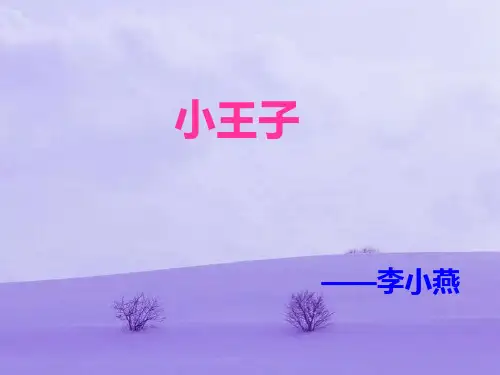
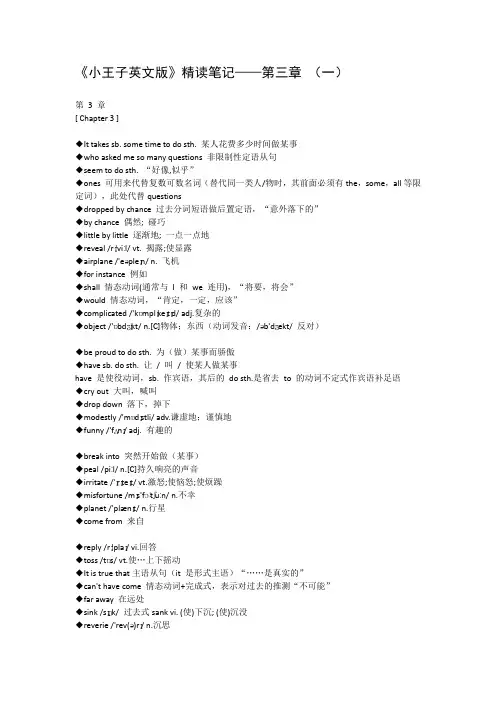
《小王子英文版》精读笔记——第三章(一)第3 章[ Chapter 3 ]◆It takes sb. some time to do sth. 某人花费多少时间做某事◆who asked me so many questions 非限制性定语从句◆seem to do sth. “好像,似乎”◆ones 可用来代替复数可数名词(替代同一类人/物时,其前面必须有the,some,all等限定词),此处代替questions◆dropped by chance 过去分词短语做后置定语,“意外落下的”◆by chance 偶然; 碰巧◆little by little 逐渐地; 一点一点地◆reveal /rɪ'viːl/ vt. 揭露;使显露◆airplane /'eəpleɪn/ n. 飞机◆for instance 例如◆shall 情态动词(通常与I 和we 连用),“将要,将会”◆would 情态动词,“肯定,一定,应该”◆complicated /'kɒmplɪkeɪtɪd/ adj.复杂的◆object /'ɒbdʒɪkt/ n.[C]物体;东西(动词发音:/əb'dʒekt/ 反对)◆be proud to do sth. 为(做)某事而骄傲◆have sb. do sth. 让/ 叫/ 使某人做某事have 是使役动词,sb. 作宾语,其后的do sth.是省去to 的动词不定式作宾语补足语◆cry out 大叫,喊叫◆drop down 落下,掉下◆modestly /'mɒdɪstli/ adv.谦虚地;谨慎地◆funny /'fʌnɪ/ adj. 有趣的◆break into 突然开始做(某事)◆peal /piːl/ n.[C]持久响亮的声音◆irritate /'ɪrɪteɪt/ vt.激怒;使恼怒;使烦躁◆misfortune /mɪs'fɔːtʃuːn/ n.不幸◆planet /'plænɪt/ n.行星◆come from 来自◆reply /rɪ'plaɪ/ vi.回答◆toss /tɒs/ vt.使…上下摇动◆It is true that主语从句(it 是形式主语)“……是真实的”◆can't have come 情态动词+完成式,表示对过去的推测“不可能”◆far away 在远处◆sink /sɪŋk/ 过去式sank vi. (使)下沉; (使)沉没◆reverie /'rev(ə)rɪ/ n.沉思◆bury /'berɪ/ v.藏身于;埋头于;专心于◆contemplation /ˌkɒntem'pleɪʃ(ə)n/ n. 凝视; 默默注视◆treasure /'treʒə/ n.金银财宝; 宝藏完整版笔记持续更新中ing公主号:中学英语Club。
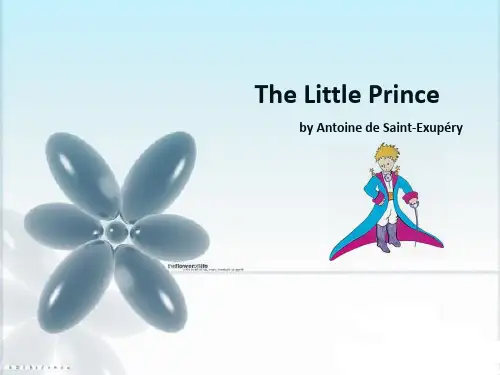
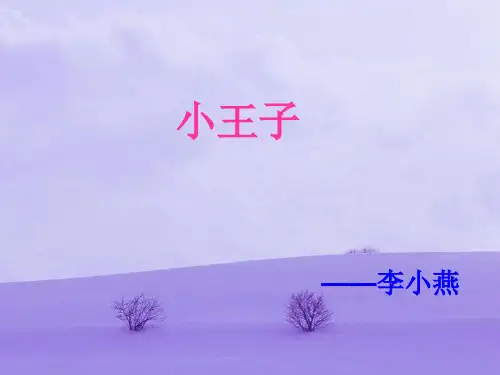
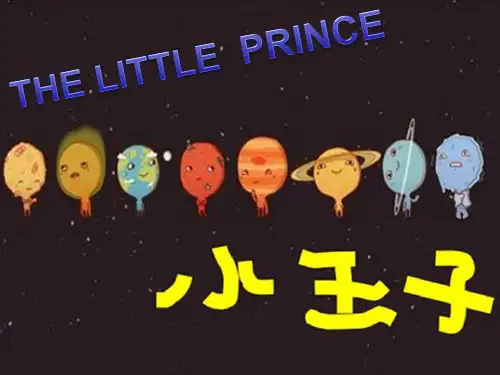
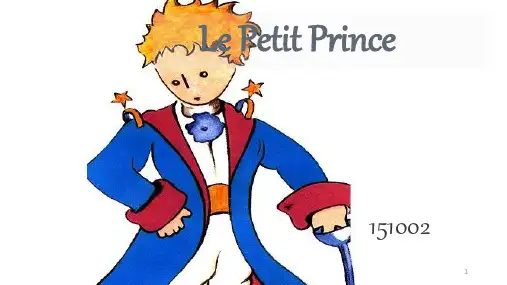
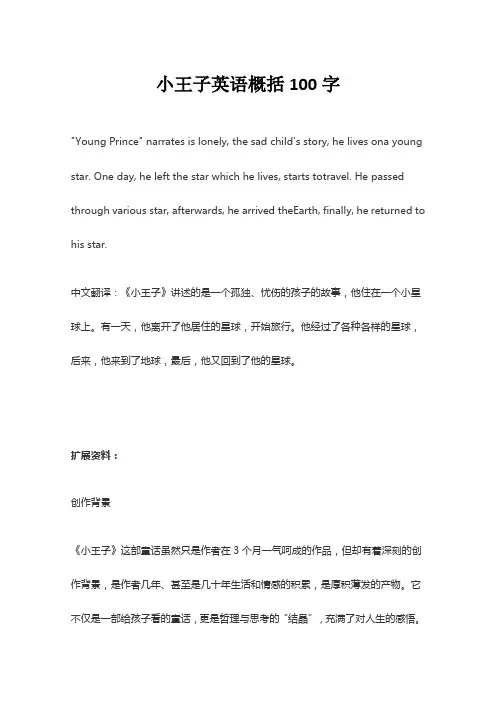
小王子英语概括100字
"Young Prince" narrates is lonely, the sad child's story, he lives ona young star. One day, he left the star which he lives, starts totravel. He passed through various star, afterwards, he arrived theEarth, finally, he returned to his star.
中文翻译:《小王子》讲述的是一个孤独、忧伤的孩子的故事,他住在一个小星球上。
有一天,他离开了他居住的星球,开始旅行。
他经过了各种各样的星球,后来,他来到了地球,最后,他又回到了他的星球。
扩展资料:
创作背景
《小王子》这部童话虽然只是作者在3个月一气呵成的作品,但却有着深刻的创作背景,是作者几年、甚至是几十年生活和情感的积累,是厚积薄发的产物。
它不仅是一部给孩子看的童话,更是哲理与思考的“结晶”,充满了对人生的感悟。
作品赏析
对成人世界价值观的抨击是《小王子》的又一主题。
作者在儿童和成人世界的“二元对立”中,抨击了虚伪、麻木的成人世界。
在对儿童“本真”世界的守望中反观成人精神世界的功利性。
并以小王子孩童式的眼光,透视出大人们的空虚、盲目和愚妄。
用浅显天真的语言写出了成人的孤独和寂寞,批判了他们错误的价值观。
故事全篇充斥着对“成人逻辑”的否定,使人们切身感受到精神家园逐渐失落的无奈。
TheLittle Prince[法] Antoine deSaint-Exupery圣埃克苏佩里This magical musical fable begins as a pilot makes a forced landing on the barren Sahara Desert. He is befriended by a "little" prince from the other planet. The Prince was in love with his flower, a vain rose, who complained about her conditions, knowing the Little Prince would attend to her every desire. Eventually, the Little Prince leaves his planet because of his inability to confront the flower.In the days that follow, the pilot learns of the small boy's history and planet-hopping journeys in which he met a King, a businessman, the drunk,an historian, and a general… It isn't until he comes to Earth that the Little Prince learnsthe secrets of the importance of life from a Fox."My life is very monotonous," the fox said. "I hunt chickens; men hunt me. All the chickens are just alike, and all the men are just alike. And, in consequence, I am a little bored. But if you tame me, it will be as if the sun came to shine on my life . I shall know the sound of a step that will be different from all the others. Other steps send me hurrying back underneath the ground. Yours will call me, like music, out of my burrow. And then look: you see the grain-fields down yonder? I do not eat bread. Wheat is of no use to me. The wheat fields have nothing to say to me. And that is sad. But you have hair that is the colour of gold. Think how wonderful that will be when you have tamed me! The grain, whichis also golden, will bring me back the thought of you. And I shall love to listen to the wind in the wheat..."The fox gazed at the little prince, for a long time."Please-- tame me!" he said."I want to, very much," the little prince replied. "But I have not much time. I have friends to discover, and a great many things to understand.""One only understands the things that one tames," said the fox. "Men have no more time to understand anything. They buy things all ready made at the shops. But there is no shop anywhere where one can buy friendship, and so men have no friends any more. If you want a friend, tame me...""What must I do, to tame you?" asked the little prince."You must be very patient," replied the fox. "First you will sit down at a little distance from me-- like that-- in the grass. I shall look at you out of the corner of my eye, and you will say nothing. Words are the source of misunderstandings. But yo u will sit a little closer to me, every day..."The next day the little prince came back."It would have been better to come back at the same hour," said the fox. "If, for example, you come at four o'clock in the afternoon, then at three o'clock I shall begin to be happy. I shall feel happier and happier as the hour advances. At four o'clock, I shall already be worrying and jumping about. I shall show you how happy I am! But if you come at just any time, I shall never know at what hour my heart is to be ready to greet you... One must observe the proper rites..."So the little prince tamed the fox. And when the hour of his departure drew near--"Ah," said the fox, "I shall cry.""It is your own fault," said the little prince. "I never wished you any sort of harm; but you wanted me to tame you...""Yes, that is so," said the fox."But now you are going to cry!" said the little prince."Yes, that is so," said the fox."Then it has done you no good at all!""It has done me good," said the fox, "because of the color of the wheat fields." And then he added:"Go and look again at the roses. You will understand now that yours is unique in all the world. Then come back to saygoodbye to me, and I will make you a present of a secret."The little prince went away, to look again at the roses."You are not at all like my rose," he said. "As yet you are nothing. No one has tamed you, and you have tamed no one. You are like my fox when I first knew him. He was only a fox like a hundred thousand other foxes. But I have made him my friend, and now he is unique in all the world."And the roses were very much embarrassed."You are beautiful, but you are empty," he went on. "One could not die for you. To be sure, an ordinary passerby would think that my rose looked just like you-- the rose that belongs to me. But in herself alone she is more important than all the hundreds of you other roses:because it is she that I have watered; because it is she that I have put under the glass globe; because it is she that I have sheltered behind the screen; because it is for her that I have killed the caterpillars (except the two or three that we saved to become butterflies); because it is she that I have listened to, when she grumbled, or boasted, or even sometimes when she said nothing. Because she is my rose.And he went back to meet the fox."Goodbye," he said."Goodbye," said the fox. "And now here is my secret, a very simple secret: I t is only with the heart that one can see rightly; what is essential is invisible to the eye.""Men have forgotten this truth," said the fox. "But you must not forget it. Youbecome responsible, forever, for what you have tamed. You are responsible for your rose...""I am responsible for my rose," the little prince repeated, so that he would be sure to remember.“我的生活很单调。
Little Prince(《小王子》英文版)Written By Antoine de Saiot-Exupery (1900~1944)PrefaceTo Leon Werthask the indulgence of the children who may read this book for dedicating it to a grown-up. I have a serious reason: he is the best friend I have in the world. I have another reason: this grown-up understands everything, even books about children. I have a third reason: he lives in France where he is hungry and cold. He needs cheering up. If all these reasons are not enough, I will dedicate the book to the child from whom this grown-up grew. All grown-ups were once children-- although few of them remember it. And so I correct my dedication:To Leon Werthwhen he was a little boy- we are introduced to the narrator, a pilot, and his ideas about grown-upsOnce when I was six years old I saw a magnificent picture in a book, called True Stories from Nature, about the primeval forest. It was a picture of a boa constrictor in the act of swallowing an animal. Here is a copy of the drawing.In the book it said: Boa constrictors swallow their prey whole, without chewing it. After that they are not able to move, and they sleep through the six months that they need for digestion.I pondered deeply, then, over the adventures of the jungle. And after some work with a colored pencil I succeeded in making my first drawing. My Drawing Number One. It looked like this:I showed my masterpiece to the grown-ups, and asked them whether the drawing frightened them.But they answered: Frighten? Why should any one be frightened by a hat?My drawing was not a picture of a hat. It was a picture of a boa constrictor digesting an elephant. But since the grown-ups were not able to understand it, I made another drawing: I drew the inside of the boaconstrictor, so that the grown-ups could see it clearly. They always need to have things explained. My Drawing Number Two looked like this:The grown-ups‘response, this time, was to advise me to lay aside my drawings of boa constrictors, whether from the inside or the outside, and devote myself instead to geography, history, arithmetic and grammar. That is why, at the age of six, I gave up what might have been a magnificent career as a painter. I had been disheartened by the failure of my Drawing Number One and my Drawing Number Two. Grown-ups never understand anything by themselves, and it is tiresome for children to be always and forever explaining things to them.So then I chose another profession, and learned to pilot airplanes. I have flown a little over all parts of the world; and it is true that geography has been very useful to me. At a glance I can distinguish China from Arizona. If one gets lost in the night, such knowledge is valuable.In the course of this life I have had a great many encounters with a great many people who have been concerned with matters of consequence.I have lived a great deal among grown-ups. I have seen them intimately, close at hand. And that hasn‘t much improved my opinion of them.Whenever I met one of them who seemed to me at all clear-sighted, Itried the experiment of showing him my Drawing Number One, which I have always kept. I would try to find out, so, if this was a person of true understanding. But, whoever it was, he, or she, would always say: That is a hat.Then I would never talk to that person about boa constrictors, or primeval forests, or stars. I would bring myself down to his level. I would talk to him about bridge, and golf, and politics, and neckties. And the grown-up would be greatly pleased to have met such a sensible man.- the narrator crashes in the desert and makes the acquaintance of the little princeSo I lived my life alone, without anyone that I could really talk to, until I had an accident with my plane in the Desert of Sahara, six years ago. Something was broken in my engine. And as I had with me neither a mechanic nor any passengers, I set myself to attempt the difficult repairs all alone. It was a question of life or death for me: I had scarcely enough drinking water to last a week.The first night, then, I went to sleep on the sand, a thousand miles from any human habitation. I was more isolated than a shipwrecked sailor on araft in the middle of the ocean. Thus you can imagine my amazement, at sunrise, when I was awakened by an odd little voice. It said:If you please-- draw me a sheep!What!Draw me a sheep!I jumped to my feet, completely thunderstruck. I blinked my eyes hard.I looked carefully all around me....上一篇英语:12种人生感悟下一篇英语:心灵鸡汤系列查看更多关于心灵鸡汤的文章网友同时还浏览了:Words to Live by 生活的忠告写情书的艺术V alentines Day(浪漫情人节)Priest V alentine relates his sSay I Love you in different laRead love code by means of cousoulLittle Prince(《小王子》英文版)And I saw a most extraordinary small person, who stood there examining me with great seriousness. Hereyou may see the best potrait that, later, I was able to make of him. But my drawing is certainly very much less charming than its model.That, however, is not my fault. The grown-ups discouraged me in my painter‘s career when I was six years old, and I never learned to draw anything, except boas from the outside and boas from the inside.Now I stared at this sudden apparition with my eyes fairly starting out of my head in astonishment. Remember, I had crashed in the desert a thousand miles from any inhabited region. And yet my little man seemed neither to be straying uncertainly among the sands, nor to be fainting from fatigue or hunger or thirst or fear. Nothing about him gave any suggestion of a child lost in the middle of the desert, a thousand miles from any human habitation. When at last I was able to speak, I said to him: But-- what are you doing here?And in answer he repeated, very slowly, as if he were speaking of a matter of great consequence: If you please-- draw me a sheep...When a mystery is too overpowering, one dare not disobey. Absurd as it might seem to me, a thousand miles from any human habitation and in danger of death, I took out of my pocket a sheet of paper and myfountain-pen. But then I remembered how my studies had been concentrated on geography, history, arithmetic, and grammar, and I told the little chap (a little crossly, too) that I did not know how to draw. He answered me: That doesn‘t matter. Draw me a sheep...But I had never drawn a sheep. So I drew for him one of the two pictures I had drawn so often. It was that of the boa constrictor from the outside. And I was astounded to hear the little fellow greet it with, No, no, no! I do not want an elephant inside a boa constrictor. A boa constrictor is a very dangerous creature, and an elephant is very cumbersome. Where I live, everything is very small. What I need is a sheep. Draw me a sheep.So then I made a drawing.He looked at it carefully, then he said: No. This sheep is already very sickly. Make me another.So I made another drawing.My friend smiled gently and indulgenty. Y ou see yourself, he said, that this is not a sheep. This is a ram. It has horns.So then I did my drawing over once more.But it was rejected too, just like the others. This one is too old. I want a sheep that will live a long time.By this time my patience was exhausted, because I was in a hurry to start taking my engine apart. So I tossed off this drawing.And I threw out an explanation with it.This is only his box. The sheep you asked for is inside.I was very surprised to see a light break over the face of my young judge:That is exactly the way I wanted it! Do you think that this sheep will have to have a great deal of grass?Why?Because where I live everything is very small...There will surely be enough grass for him, I said. It is a very small sheep that I have given you.He bent his head over the drawing:Not so small that-- Look! He has gone to sleep...And that is how I made the acquaintance of the little prince....上一篇英语:12种人生感悟下一篇英语:心灵鸡汤系列查看更多关于心灵鸡汤的文章网友同时还浏览了:Words to Live by 生活的忠告写情书的艺术V alentines Day(浪漫情人节)Priest V alentine relates his sSay I Love you in different laRead love code by means of cousoulLittle Prince(《小王子》英文版)ank into a reverie, which lasted a long time. Then, taking my sheep out of his pocket, he buried himself in the contemplation of his treasure.Y ou can imagine how my curiosity was aroused by this half-confidence about the other planets. I made a great effort, therefore, to find out more on this subject.My little man, where do you come from? What is this ‘where I live,‘of which you speak? Where do you want to take your sheep?After a reflective silence he answered: The thing that is so good about the box you have given me is that at night he can use it as his house.That is so. And if you are good I will give you a string, too, so that you can tie him during the day, and a post to tie him to.But the little prince seemed shocked by this offer: Tie him! What aqueer idea!But if you don‘t tie him, I said, he will wander off somewhere, and get lost.My friend broke into another peal of laughter: But where do you think he would go?Anywhere. Straight ahead of him.Then the little prince said, earnestly: That doesn‘t matter. Where I live, everything is so small!And, with perhaps a hint of sadness, he added: Straight ahead of him, nobody can go very far...- the narrator speculates as to which asteroid from which the little prince cameI had thus learned a second fact of great importance: this was that the planet the little prince came from was scarcely any larger than a house!But that did not really surprise me much. I knew very well that in addition to the great planets-- such as the Earth, Jupiter, Mars, V enus-- to which we have given names, there are also hundreds of others, some of which are so small that one has a hard time seeing them through the telescope. When an astronomer discovers one of these he does not give ita name, but only a number. He might call it, for example, Asteroid 325.I have serious reason to believe that the planet from which the little prince came is the asteroid known as B-612. This asteroid has only once been seen through the telescope. That was by a Turkish astronomer, in 1909.On making his discovery, the astronomer had presented it to the International Astronomical Congress, in a great demonstration. But he was in Turkish costume, and so nobody would believe what he said.Grown-ups are like that...Fortunately, however, for the reputation of Asteroid B-612, a Turkish dictator made a law that his subjects, under pain of death, should change to European costume. So in 1920 the astronomer gave his demonstration all over again, dressed with impressive style and elegance. And this time everybody accepted his report.If I have told you these details about the asteroid, and made a note ofits number for you, it is on account of the grown-ups and their ways. When you tell them that you have made a new friend, they never ask you any questions about essential matters. They never say to you, What does his voice sound like? What games does he love best? Does he collect butterflies? Instead, they demand: How old is he? How many brothers has he? How much does he weigh? How much money does his father make? Only from these figures do they think they have learned anything about him.If you were to say to the grown-ups: I saw a beautiful house made of rosy brick, with geraniums in the windows and doves on the roof, they would not be able to get any idea of that house at all. Y ou would have to say to them: I saw a house that cost $20,000. Then they would exclaim: Oh, what a pretty house that is!Just so, you might say to them: The proof that the little prince existed is that he was charming, that he laughed, and that he was looking for a sheep. If anybody wants a sheep, that is a proof that he exists. And what good would it do to tell them that? They would shrug their shoulders, and treat you like a child. But if you said to them: The planet he came from is Asteroid B-612, then they would be convinced, and leave you in peace from their questions.They are like that. One must not hold it against them. Children should always show great forbearance toward grown-up people.But certainly, for us who understand life, figures are a matter of indifference. I should have liked to begin this story in the fashion of the fairy-tales. I should have like to say: Once upon a time there was a little prince who lived on a planet that was scarcely any bigger than himself, and who had need of a sheep...To those who understand life, that would have given a much greater air of truth to my sto...上一篇英语:12种人生感悟下一篇英语:心灵鸡汤系列查看更多关于心灵鸡汤的文章网友同时还浏览了:Words to Live by 生活的忠告写情书的艺术V alentines Day(浪漫情人节)Priest V alentine relates his sSay I Love you in different laRead love code by means of cousoulLittle Prince(《小王子》英文版)ry.For I do not want any one to read my book carelessly. I have sufferedtoo much grief in setting down these memories. Six years have already passed since my friend went away from me, with his sheep. If I try to describe him here, it is to make sure that I shall not forget him. To forget a friend is sad. Not every one has had a friend. And if I forget him, I may become like the grown-ups who are no longer interested in anything but figures...It is for that purpose, again, that I have bought a box of paints and some pencils. It is hard to take up drawing again at my age, when I have never made any pictures except those of the boa constrictor from the outside and the boa constrictor from the inside, since I was six. I shall certainly try to make my portraits as true to life as possible. But I am not at all sure of success. One drawing goes along all right, and another has no resemblance to its subject. I make some errors, too, in the littl e prince ‘s height: in one place he is too tall and in another too short. And I feel some doubts about the color of his costume. So I fumble along as best I can, now good, now bad, and I hope generally fair-to-middling.In certain more important details I shall make mistakes, also. But that is something that will not be my fault. My friend never explained anything to me. He thought, perhaps, that I was like himself. But I, alas, do not know how to see sheep through t he walls of boxes. Perhaps I am alittle like the grown-ups. I have had to grow old.- we are warned as to the dangers of the baobabsAs each day passed I would learn, in our talk, something about the little prince‘s planet, his departure from it, his journey. The information would come very slowly, as it might chance to fall from his thoughts. It was in this way that I heard, on the third day, about the catastrophe of the baobabs.This time, once more, I had the sheep to thank for it. For the little prince asked me abruptly-- as if seized by a grave doubt-- It is true, isn‘t it, that sheep eat little bushes?Y es, that is true.Ah! I am glad!I did not understand why it was so important that sheep should eat little bushes. But the little prince added:Then it follows that they also eat baobabs?I pointed out to the little prince that baobabs were not little bushes, but, on the contrary, trees as big as castles; and that even if he took a whole herd of elephants away with him, the herd would not eat up one single baobab.The idea of the herd of elephants made the little prince laugh.We would have to put them one on top of the other, he said.But he made a wise comment:Before they grow so big, the baobabs start out by being little.That is strictly correct, I said. But why do you want the sheep to eat the little baobabs?He answered me at once, Oh, come, come! , as if he were speaking of something that was self-evident. And I was obliged to make a great mental effort to solve this problem, without any assistance.Indeed, as I learned, there were on the planet where the little prince lived-- as on all planets-- good plants and bad plants. In consequence, there were good seeds from good plants, and bad seeds from bad plants. But seeds are invisible. They sleep deep in the heart of the earth‘s darkness, until some one among them is seized with the desire to awaken. Then this little seed will stretch itself and begin-- timidly at first-- to push a charming little sprig inoffensively upward toward the sun. If it is only a sprout of radish or the sprig of a rose-bush, one would let it grow wherever it might wish. But when it is a bad plant, one must destroy it as soon as possible, the very first instant that one recognizes it.Now there were some terrible seeds on the planet that was the home of the little prince; and these were the seeds of the baobab. The soil of that planet was infested with them. A baobab is something you will never, never be able to get rid of if you attend to it too late. It spreads over the entire planet. It bores clear through it with its roots. And if the planet is too small, and the baobabs are too many, they split it in pieces...It is a question of discipline, the little prince said to me later on. When you‘ve finished your own toilet in the morning, then it is time to attend to the toilet of your planet, just so, with the greatest care. Y ou must see to it that you pull up regularly all the baobabs, at the very first moment when they can be distinguished from the rosebushes which they resemble so closely in their earliest youth. It is very tedious work, the little prince added, but very easy.And one day he...上一篇英语:12种人生感悟下一篇英语:心灵鸡汤系列查看更多关于心灵鸡汤的文章网友同时还浏览了:Words to Live by 生活的忠告写情书的艺术V alentines Day(浪漫情人节)Priest V alentine relates his sSay I Love you in different laRead love code by means of cousoulLittle Prince(《小王子》英文版)said to me: Y ou ought to make a beautiful drawing, so that the children where you live can see exactly how all this is. That would be very useful to them if they were to travel some day. Sometimes, he added, there is no harm in putting off a piece of work until another day. But when it is a matter of baobabs, that always means a catastrophe. I knew a planet that was inhabited by a lazy man. He neglected three little bushes...So, as the little prince described it to me, I have made a drawing of that planet. I do not much like to take the tone of a moralist. But the danger of the baobabs is so little understood, and such considerable risks would be run by anyone who might get lost on an asteroid, that for once I am breaking through my reserve. Children, I say plainly, watch out for the baobabs!My friends, like myself, have been skirting this danger for a long time, without ever knowing it; and so it is for them that I have worked so hard over this drawing. The lesson which I pass on by this means is worth all the trouble it has cost me.Perhaps you will ask me, Why are there no other drawing in this book as magnificent and impressive as this drawing of the baobabs?The reply is simple. I have tried. But with the others I have not been successful. When I made the drawing of the baobabs I was carried beyond myself by the inspiring force of urgent necessity....上一篇英语:12种人生感悟下一篇英语:心灵鸡汤系列查看更多关于心灵鸡汤的文章网友同时还浏览了:Words to Live by 生活的忠告写情书的艺术V alentines Day(浪漫情人节)Priest V alentine relates his sSay I Love you in different laRead love code by means of cousoulLittle Prince(《小王子》英文版)uot; I cried. No, no no! I don‘t believe anything. I answered you with the first thing that came into my head. Don‘t you see-- I am very busy with matters of consequence!He stared at me, thunderstruck.Matters of consequence!He looked at me there, with my hammer in my hand, my fingers black with engine-grease, bending down over an object which seemed to him extremely ugly...Y ou talk just like the grown-ups!That made me a little ashamed. But he went on, relentlessly:Y ou mix everything up together... Y ou confuse everything...He was really very angry. He tossed his golden curls in the breeze.I know a planet where there is a certain red-faced gentleman. He has never smelled a flower. He has never looked at a star. He has never loved any one. He has never done anything in his life but add up figures. And all day he says over and over, just like you: ‘I am busy with matters of consequence!‘And that makes him swell up with pride. But he is not a man-- he is a mushroom!A what?A mushroom!The little prince was now white with rage.The flowers have been growing thorns for millions of years. For millions of years the sheep have been eating them just the same. And is it not a matter of consequence to try to understand why the flowers go to so much trouble to grow thorns which are never of any use to them? Is the warfare between the sheep and the flowers not important? Is this not of more consequence than a fat red-faced gentleman‘s sums? And if I know-- I, myself-- one flower which is unique in the world, which grows nowhere but on my planet, but which one little sheep can destroy in a single bite some morning, without even noticing what he is doing-- Oh! Y ou think that is not important!His face turned from white to red as he continued:If some one loves a flower, of which just one single blossom grows in all the millions and millions of stars, it is enough to make him happy just to look at the stars. He can say to himself, ‘Somewhere, my flower is there...‘But if the sheep eats the flower, in one moment all his stars will be darkened... And you think that is not important!He could not say anything more. His words were choked by sobbing.The night had fallen. I had let my tools drop from my hands. Of what moment now was my hammer, my bolt, or thirst, or death? On one star, one planet, my planet, the Earth, there was a little prince to be comforted.I took him in my arms, and rocked him. I said to him:The flower that you love is not in danger. I will draw you a muzzle for your sheep. I will draw you a railing to put around your flower. I will--I did not know what to say to him. I felt awkward and blundering. I did not know how I could reach him, where I could overtake him and go on hand in hand with him once more.It is such a secret place, the land of tears....上一篇英语:12种人生感悟下一篇英语:心灵鸡汤系列查看更多关于心灵鸡汤的文章网友同时还浏览了:Words to Live by 生活的忠告写情书的艺术V alentines Day(浪漫情人节)Priest V alentine relates his sSay I Love you in different laRead love code by means of cousoulLittle Prince(《小王子》英文版)prince could guess easily enough that she was not any too modest-- but how moving-- and exciting-- she was!I think it is time for breakfast, she added an instant later. If you would have the kindness to think of my needs--And the little prince, completely abashed, went to look for a sprinkling-can of fresh water. So, he tended the flower.So, too, she began very quickly to torment him with her vanity-- which was, if the truth be known, a little difficult to deal with. One day, for instance, when she was speaking of her four thorns, she said to the little prince:Let the tigers come with their claws!There are no tigers on my planet, the little prince objected. And,anyway, tigers do not eat weeds.I am not a weed, the flower replied, sweetly.Please excuse me...I am not at all afraid of tigers, she went on, but I have a horror of drafts.I suppose you wouldn‘t have a screen for me?A horror of drafts-- that is bad luck, for a plant, remarked the little prince, and added to himself, This flower is a very complex creature...At night I want you to put me under a glass globe. It is very cold where you live. In the place I came from--But she interrupted herself at that point. She had come in the form of a seed. She could not have known anything of any other worlds. Embarassed over having let herself be caught on the verge of such a na飗e untruth, she coughed two or three times, in order to put the little prince in the wrong.The screen?I was just going to look for it when you spoke to me...Then she forced her cough a little more so that he should suffer from remorse just the same.So the little prince, in spite of all the good will that was inseparable from his love, had soon come to doubt her. He had taken seriously words which were without importance, and it made him very unhappy.I ought not to have listened to her, he confided to me one day. One never ought to listen to the flowers. One should simply look at them and breathe their fragrance. Mine perfumed all my planet. But I did not know how to take pleasure in all her grace. This tale of claws, which disturbed me so much, should only have filled my heart with tenderness and pity. And he continued his confidences:The fact is that I did not know how to understand anything! I ought to have judged by deeds and not by words. She cast her fragrance and her radiance over me. I ought never to have run away from her... I ought to have guessed all the affection that lay behind her poor little strategems. Flowers are so inconsistent! But I was too young to know how to love her......上一篇英语:12种人生感悟下一篇英语:心灵鸡汤系列查看更多关于心灵鸡汤的文章网友同时还浏览了:Words to Live by 生活的忠告写情书的艺术V alentines Day(浪漫情人节)Priest V alentine relates his sSay I Love you in different laRead love code by means of cousoulLittle Prince(《小王子》英文版)My cold is not so bad as all that... the cool night air will do me good. I am a flower.But the animals--Well, I must endure the presence of two or three caterpillars if I wish to become acquainted with the butterflies. It seems that they are very beautiful. And if not the butterflies-- and the caterpillars-- who will call upon me? Y ou will be far away... as for the large animals-- I am not at all afraid of any of them. I have my claws.And, na飗ely, she showed her four thorns. Then she added:Don‘t linger like this. Y ou have decided to go away. Now go!For she did not want him to see her crying. She was such a proud flower......上一篇英语:12种人生感悟下一篇英语:心灵鸡汤系列查看更多关于心灵鸡汤的文章网友同时还浏览了:Words to Live by 生活的忠告写情书的艺术V alentines Day(浪漫情人节)Priest V alentine relates his sSay I Love you in different laRead love code by means of cousoulLittle Prince(《小王子》英文版)ed, which one of us would be in the wrong? the king demanded. The general, or myself?Y ou, said the little prince firmly.Exactly. One much require from each one the duty which each one can perform, the king went on. Accepted authority rests first of all on reason. If you ordered your people to go and throw themselves into the sea, they would rise up in revolution. I have the right to require obedience because my orders are reasonable.Then my sunset? the little prince reminded him: for he never forgot a question once he had asked it.Y ou shall have your sunset. I shall command it. But, according to my science of government, I shall wait until conditions are favorable.When will that be? inquired the little prince.Hum! Hum! replied the king; and before saying anything else he consulted a bulky almanac. Hum! Hum! That will be about-- about-- that will be this evening about twenty minutes to eight. And you will see how well I am obeyed.The little prince yawned. He was regretting his lost sunset. And then, too, he was already beginning to be a little bored.I have nothing more to do here, he said to the king. So I shall set out on my way again.Do not go, said the king, who was very proud of having a subject. Do not go. I will make you a Minister!Minister of what?Minster of-- of Justice!But there is nobody here to judge!We do not know that, the king said to him. I have not yet made a complete tour of my kingdom. I am very old. There is no room here for a carriage. And it tires me to walk.Oh, but I have looked already! said the little prince, turning around to give one more glance to the other side of the planet. On that side, as on this, there was nobody at all...Then you shall judge yourself, the king answered. that is the most difficult thing of all. It is much more difficult to judge oneself than to judge others. If you succeed in judging yourself rightly, then you are indeed a man of true wisdom.Y es, said the little prince, but I can judge myself anywhere. I do not need to live on this planet.Hum! Hum! said the king. I have good reason to believe that somewhere on my planet there is an old rat. I hear him at night. Y ou can。
小王子英文原文摘抄Introduction"The Little Prince" is a famous novel written by Antoine de Saint-Exupéry, a French writer and aviator. It was published in 1943 and has since become a classic ofchildren's literature. Here are some excerpts from theoriginal English version of the book.Excerpt 1: The narrator meets the little prince"In the middle of the desert I met a little prince. He was standing in front of me, all alone. He had golden hair, a cheerful face, and a scarf tied around his neck. He said to me: 'Please draw me a sheep.' I drew him a sheep. And he said: 'No, not that one. I want a sheep that will live a longtime.' So I drew him another sheep."This excerpt introduces the main characters of the story, the narrator and the little prince. It also shows the innocence and simplicity of the little prince, who asks for a sheep as if it were the most natural thing in the world.Excerpt 2: The little prince talks to the fox"'What does tamed mean?''It means to create ties.''To create ties?''Yes, for me you are only a little boy, like a hundred thousand other little boys. And I have no need of you. Andyou have no need of me, either. For you I'm only a fox like a hundred thousand other foxes. But if you tame me, we'll need each other. You'll be the only boy in the world for me, andI'll be the only fox in the world for you.'"In this excerpt, the little prince meets a fox who teaches him about the importance of connections and relationships. The fox wants to be tamed by the little prince, so they can have a special bond that is different from other relationships.Excerpt 3: The little prince and the rose"'I thought that I was rich because I had a flower that nobody else had. But all I have is a common rose. She's not that important.''But she's the one you watered. She's the one you put underthe glass. She's the one you sheltered behind the screen.You're the one responsible for her. For her you're unique inall the world.'"This excerpt emphasizes the value of taking care of something, even if it seems small and insignificant. Thelittle prince realizes that his rose is special because hehas taken care of it, and that makes it unique and importantto him.Conclusion"The Little Prince" is a timeless story that teaches us about the importance of love, friendship, and connections. These excerpts from the original English version of the book capture the innocence and simplicity of the little prince and the universal lessons that he learns on his journey.。